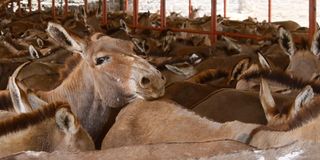Turkana hit by spike in donkey thefts amid illegal skin trade

The Turkana County government is moving to register donkeys and regulate their movement as villages are reporting an increase in livestock theft.
What you need to know:
- “We fear that the donkeys may become extinct if such illegal dealings are not stopped. Thieves who don’t even rear a single goat brazenly steal and sell donkeys at throwaway prices,” Mr Kisike told Nation.africa,
- There is a proposed legislation that will mandate proper identification and registration of donkeys, regulate their movement, and impose heavy penalties on those caught engaging in illegal trade or mistreatment of the animals.
The Turkana County government is moving to register donkeys and regulate their movement as villages are reporting an increase in livestock theft.
Far-flung villages with limited security presence have been identified by donkey owners as targets of the illegal donkey skin trade.
This situation in villages in Loima, Turkana West, Lokichoggio, Turkana Central and Turkana North sub-counties is contributing to the dwindling donkey population, residents say.
The situation has now attracted the attention of authorities who have announced plans to implement new laws aimed at protecting donkeys from abuse and exploitation.
A donkey owner, Emmanuel Kisike claimed that since the establishment of a donkey slaughterhouse in 2017 in Turkana County, there have been increased cases of donkey theft because of their skin and not meat.
“I lost seven donkeys at Lokiriama village in 2018. The thieves just took the skin from three of the animals and left the meat,” Mr Kisike said.
The situation was even widespread in major towns such as Lodwar after some locals were recruited as dealers in return for quick cash, he claimed.
“We fear that the donkeys may become extinct if such illegal dealings are not stopped. Thieves who don’t even rear a single goat brazenly steal and sell donkeys at throwaway prices,” Mr Kisike told Nation.africa,
There is a proposed legislation that will mandate proper identification and registration of donkeys, regulate their movement, and impose heavy penalties on those caught engaging in illegal trade or mistreatment of the animals.
Assistant County Commissioner from Turkana Central Sub County Michael Kiguta stated that the stock theft has caused a significant decline in the donkey population.
“I appeal to the management of the donkey slaughterhouses to resist involvement in underhand deals and ensure that for any donkey they buy legitimately belongs to an owner bearing clearance from the area chief and follow up call made as a proof,” Mr Kiguta said.
The Agency for Cross-Border Pastoralists Development executive director Samson Kimeli says the illegal donkey trade is driven by demand for donkey hides used in Chinese traditional medicines.
Mr Kimeli added that research by the Kenya Agricultural and Livestock Research Organization revealed that the animals face extinction because the existing donkey population cannot sustain the business of the four slaughterhouses.
“We are creating awareness of the need to protect donkey during meetings with donkey owners, authorities, and local leaders. We also support animal health check-ups, treatment, and educational sessions on how to properly care for donkeys,” he said.
Mr Julius Ekalale, a resident said that the current population of donkeys in the county is low due to the beast of burden’s long gestation period of 12 months.
Another farmer Maxmillah Akai said women in remote areas rely on donkeys to fetch water and carry food items from the market.
“We need support from the government to stop commercialisation of the donkey trade as it is negatively affecting our way of life,” Ms Akai said.





